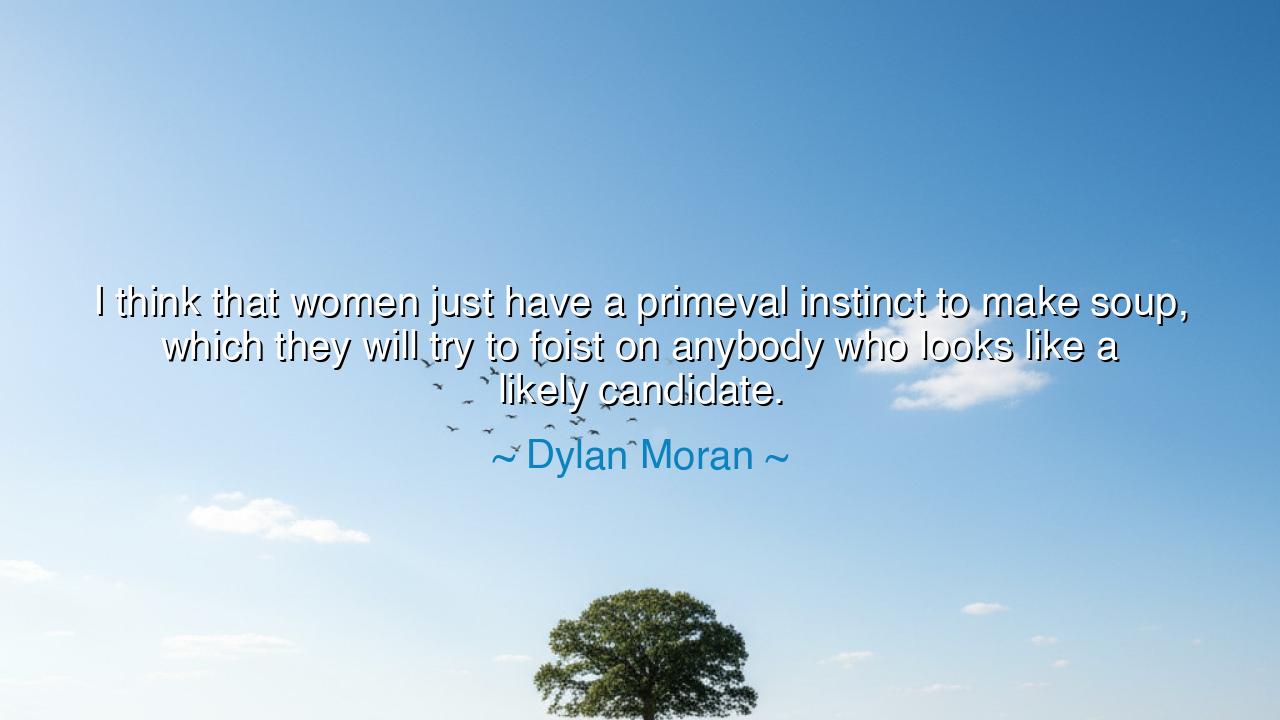
I think that women just have a primeval instinct to make soup
I think that women just have a primeval instinct to make soup, which they will try to foist on anybody who looks like a likely candidate.






When Dylan Moran jested, “I think that women just have a primeval instinct to make soup, which they will try to foist on anybody who looks like a likely candidate,” he clothed in humor a truth as old as fire itself. The act of preparing soup is no mere culinary duty, but an ancient gesture of care, of preservation, of survival. It is a symbol of how nurture has always been woven into the fabric of civilization, how the simplest offering of warmth and nourishment can bind the many into one.
The ancients would recognize in this image the echoes of the hearth, that sacred place around which tribes gathered and stories were told. Before temples were built or laws inscribed, there was the pot over the flame, tended often by women, who guarded the health and strength of the clan. To call it primeval instinct is to acknowledge that deep within the human spirit lies the impulse to nourish, to heal, to restore life through sustenance. Soup, humble and unadorned, becomes the emblem of that impulse.
History too gives us examples of this truth. In the dark years of war, women in villages across Europe would share great kettles of soup with soldiers and strangers alike. The French Resistance, hidden in the countryside, often relied on such humble offerings to sustain their fighters. What seemed like an ordinary meal became an act of quiet heroism, a way of giving strength where swords and bullets alone could not prevail. In this, Moran’s jest unveils a deeper reality: the instinct to nurture is a power equal to the instinct to fight.
To “foist” soup upon another, as Moran playfully describes, is more than insistence—it is the compulsion of love. Just as the shepherd guards his flock and the physician tends the sick, so too the nurturer offers food, unasked yet always needed. The gesture may seem small, yet it carries with it the echo of ages, reminding us that survival itself was secured not only by hunters and warriors, but by the unseen hands stirring the pot.
Thus, let us hear the wisdom beneath the humor: what appears as a simple bowl of soup is in truth a vessel of history, instinct, and devotion. The primeval instinct to nurture, embodied in women but alive in all who give, is not weakness but strength, not trivial but foundational. For civilizations rise and fall, yet so long as there is warmth in the pot and generosity in the heart, humankind endures.






ANBui Thi Anh Ngoc
While Dylan Moran’s quote is likely intended as humor, it does raise interesting questions about how gendered expectations shape everyday activities. Why is making soup a trait that is specifically attributed to women? Could this joke be seen as dismissive of men who also enjoy cooking or take on domestic responsibilities? How can we move past such stereotypes to create a more equitable and diverse view of domestic roles?
NLngo ngoc linh
This quote by Dylan Moran highlights a playful stereotype about women and their desire to cook, but does it also reflect deeper societal assumptions about gender? Why is making soup depicted as a ‘primeval instinct’ for women? Does this view undermine the idea that cooking can be a shared or even a non-gendered activity, or does it simply offer a humorous take on the universal nature of caregiving and food preparation?
TSTV Simmy
Moran’s comment about women and their ‘primeval instinct’ to make soup is amusing but also raises questions about how gender roles are often oversimplified in humor. Is this an attempt to make light of domesticity, or does it perpetuate the idea that women’s worth is tied to their domestic skills? What does this type of humor say about society’s expectations for women in the home?
NDNguyen Duy
Dylan Moran’s quote seems to playfully reinforce a stereotype about women and food preparation. While it’s meant to be humorous, does this comment subtly reinforce outdated gender roles? Why is the act of making soup framed as an inherently feminine trait, and is it fair to reduce women to such stereotypes? How can we encourage a more inclusive understanding of cooking and other traditionally gendered activities?